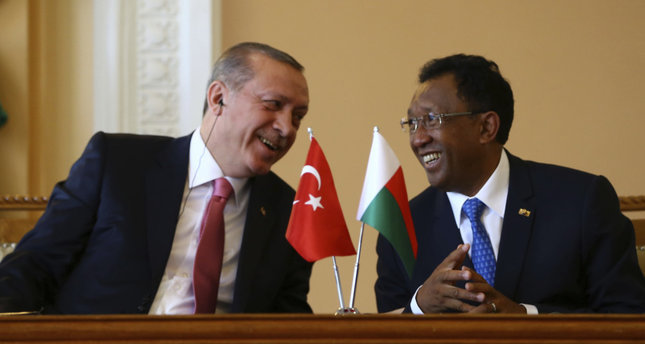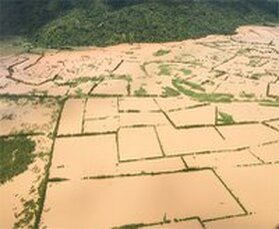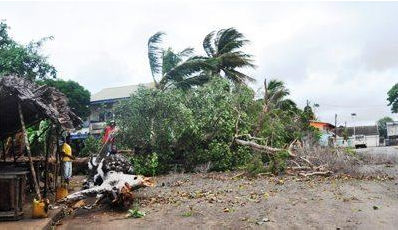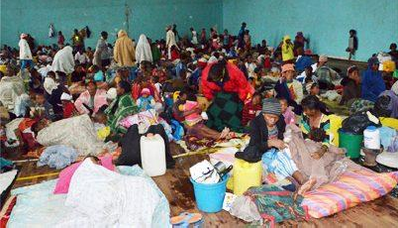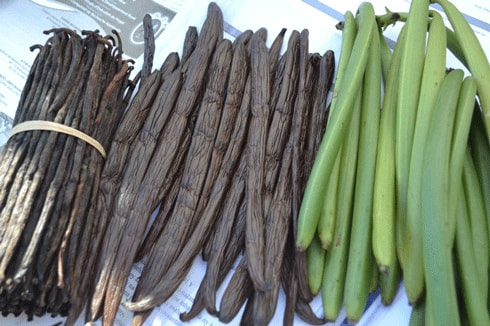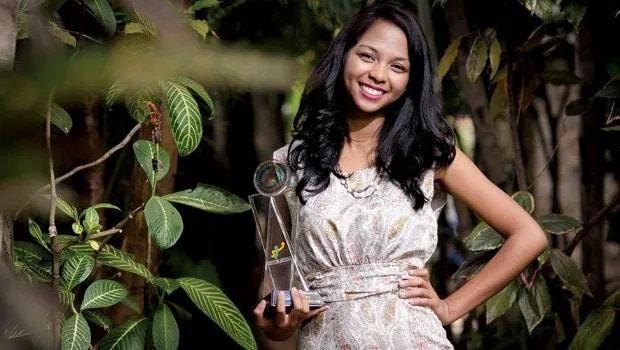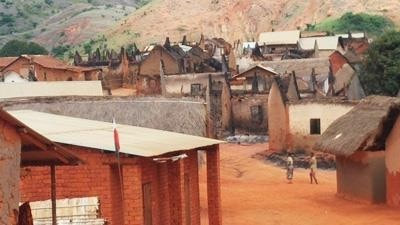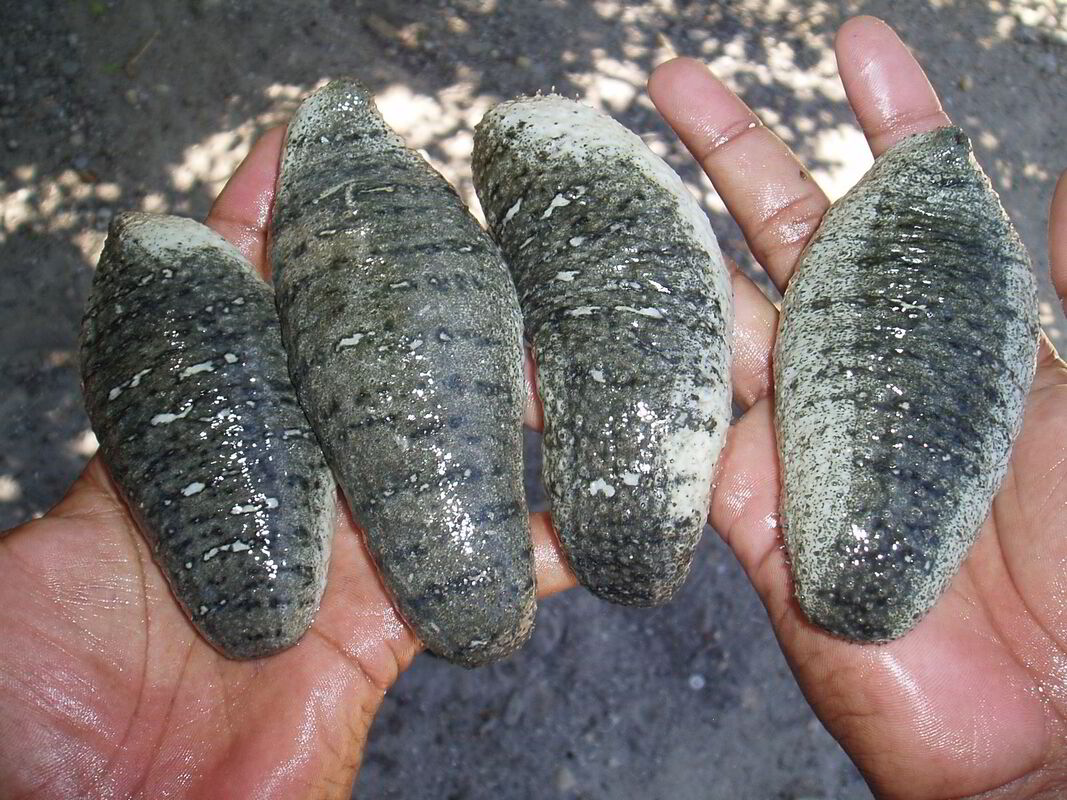Anglo-Malagasy Society Newsletter 95: March 2017 |
| ||
Society activities
The Society’s first meeting in 2017 heard a wide-ranging talk from Dr Ian Conacher on the travels in Madagascar in 1862 of Dr Charles Meller, who was one of Dr Livingstone’s doctors, all natural historians engaged in the campaign against the slave trade.
The events later in the year will be on the evening of Wednesday 28th June as part of the celebration of Independence Day in Madagascar and then a daytime gathering on 28th October with a range of talks. The details will be publicised on Facebook and on our website, which also has a summary of some of the previous talks for those unable to attend, together with much other useful information. This includes directions to the venue for our meetings, which is the Upper Vestry Hall of St George’s Church, Bloomsbury, London WC1A 2HR, two minutes’ walk from the British Museum.
The next newsletter will be published in June 2017. Please send any material for inclusion as well as any changes in your contact details to the editor Julian Cooke, whose e-mail address is [email protected].
The events later in the year will be on the evening of Wednesday 28th June as part of the celebration of Independence Day in Madagascar and then a daytime gathering on 28th October with a range of talks. The details will be publicised on Facebook and on our website, which also has a summary of some of the previous talks for those unable to attend, together with much other useful information. This includes directions to the venue for our meetings, which is the Upper Vestry Hall of St George’s Church, Bloomsbury, London WC1A 2HR, two minutes’ walk from the British Museum.
The next newsletter will be published in June 2017. Please send any material for inclusion as well as any changes in your contact details to the editor Julian Cooke, whose e-mail address is [email protected].
Politics in Madagascar
At the traditional new year ceremony in January President Hery Rajaonarimampianina hosted a banquet for 1400 people, hardly lower than the previous year in spite of criticism of the (undeclared) cost of such an event when many Malagasy were suffering from malnutrition. The event was boycotted by the MAPAR party who support Andry Rajoelina who, after a high-profile media appearance over Christmas, returned to his house in France.
Rajaonarimampianina announced a 7% increase in salaries for civil servant, made a number of presidential pardons and also promoted yet more officers to the rank of general. In his address he said that 2016 had seen an improvement in the government’s finances and that 2017 would see greater reforms to continue the process. Marc Ravalomanana, the former president, said that it would be a year of reconciliation while Didier Ratsiraka, another former president and still active, said that if given a mandate he would secure self-sufficiency in food in the country.
The positioning for presidential elections due in 2018 continued. Christine Razanamahasoa, the former justice minister under Rajoelina, led opposition to a mooted extension of the current mandate for the president into 2019. Ravalomanana made a visit to the United States in January, which coincided with the inauguration of Donald Trump whom he congratulated as a fellow businessman; he met with a vice-president of the World Bank. On 17th January the electoral commission CENI and the United Nations presented the president with a series of papers on preparations for free and fair elections although some of their requirements would necessitate a reform of the electoral law, such as setting a fixed date for the election and the designation of the fokontany as one of the groups involved.
The head of the FJKM, representing Protestant churches, in a new year address in mid-January said that the country faced continued challenges from poverty, insecurity, corruption and trafficking and called on all Christians to help to deal with the issues, a call that was echoed by the head of state who was in attendance. There was further debate in January over the official role of the opposition: the Haute Cour Constitutionelle (HCC) said that only parliamentarians could engage in appointing the head of the opposition, for whom the role of vice-president had been reserved and for which there were few contenders until Hajo Andrianainarivelo of MMM put himself forward. Mireille Rabenoro was elected head of the new Commission Nationale Indépendante des Droits de l’Homme (CNIDH) some two months after its creation; she is known for her defence of women’s rights.
Rajaonarimampianina announced a 7% increase in salaries for civil servant, made a number of presidential pardons and also promoted yet more officers to the rank of general. In his address he said that 2016 had seen an improvement in the government’s finances and that 2017 would see greater reforms to continue the process. Marc Ravalomanana, the former president, said that it would be a year of reconciliation while Didier Ratsiraka, another former president and still active, said that if given a mandate he would secure self-sufficiency in food in the country.
The positioning for presidential elections due in 2018 continued. Christine Razanamahasoa, the former justice minister under Rajoelina, led opposition to a mooted extension of the current mandate for the president into 2019. Ravalomanana made a visit to the United States in January, which coincided with the inauguration of Donald Trump whom he congratulated as a fellow businessman; he met with a vice-president of the World Bank. On 17th January the electoral commission CENI and the United Nations presented the president with a series of papers on preparations for free and fair elections although some of their requirements would necessitate a reform of the electoral law, such as setting a fixed date for the election and the designation of the fokontany as one of the groups involved.
The head of the FJKM, representing Protestant churches, in a new year address in mid-January said that the country faced continued challenges from poverty, insecurity, corruption and trafficking and called on all Christians to help to deal with the issues, a call that was echoed by the head of state who was in attendance. There was further debate in January over the official role of the opposition: the Haute Cour Constitutionelle (HCC) said that only parliamentarians could engage in appointing the head of the opposition, for whom the role of vice-president had been reserved and for which there were few contenders until Hajo Andrianainarivelo of MMM put himself forward. Mireille Rabenoro was elected head of the new Commission Nationale Indépendante des Droits de l’Homme (CNIDH) some two months after its creation; she is known for her defence of women’s rights.
|
The visit by the Turkish president, Recep Tayyip Erdoğan, to Madagascar on 25th January as part of a tour of East Africa raised the prospect of increased trade but also of tension over his stipulation that the government deal with the network of Fethullah Gülen, accused of being behind the putative coup d’état in Turkey in 2016.
Cardinal Pietro Parolin, the secretary of state at the Vatican, held a mass in late January to celebrate fifty years of relations between Madagascar and the Holy See. In February SeFaFi, the civil rights body, criticised the use of religion by politicians to enhance their position. |
In early February the electoral commission CENI declared that it had only met 60% of its objectives in 2016. In particular it still had to agree the location of all polling stations and to remove duplications or dead people from the electoral register, while in spite of a media campaign the population had not been quick to register to vote (although the latest list, which was finished at end January, had seen a 5% increase in numbers). Béatrice Atallah, the foreign minister, announced plans to engage the country’s diaspora including an estimated 140,000 in France, 60% of whom were women and most of whom were well-qualified.
CENI also insisted that the election timetable for 2018 should remain intact and that there should be no extension. Antonio Benedito Sanchez, the EU ambassador, said on 9th February that the election should be open to all political forces to which the president replied that Madagascar was sovereign and that it was not down to foreign countries to decide. Rivo Rakotovao, president of the HVM party and a government minister, raised again the prospect of excluding Rajoelina and Ravalomanana.
The commemoration of the shootings in 7th February 2009 passed peacefully and the protest movement AV7 has ebbed, perhaps because 214 of its 217 members of have been recruited as civil servants since August 2016. Monja Roindefo, a prime minister under the Transition regime, said the values and objectives of the movement had been lost.
On 15th February the elusive senator René Lylison was sentenced in absentia to a year in prison for civil disorder and threatening the security of the state; the MAPAR senator had had a prominent role in the Rajoelina regime as head of the FIS (Force d’Intervention Spéciale). His family contested the decision, the president of the Senate Honoré Rakotomanana said that he might retain his position and the HCC said it would not intervene. In a separate development there were reports the same month of a fresh attempt to remove Rakotomanana from his role.
On 22nd February the United Nations, through the UNDP, moved to re-launch its efforts to help reconciliation between the different groups in Madagascar ahead of the elections in 2018. Ravalomanana was present at the event and was careful to suggest that he should be entitled to participate in spite of the Cotonou accord that excluded him and Rajoelina. The UNDP has also helped to coordinate the proposed funding of the elections and said $12m was available.
The prime minister, Olivier Mahafaly, was one of the recipients of the Mandela Prize for Courage for 2016 which was awarded for his vision of development in Madagascar and in Africa.
Atallah attended a meeting of the Commission de l’Océan Indien on Réunion on 26th February which covered regional trade and reached an accord for further funding from the EU. A meeting in Swaziland of the Southern African Development Community from 17th March considered the threats to food security and Rajaonarimampianina called for regional support after the damage from Cyclone Enawo. Later in March he met the Chinese vice-premier Zhang Gaoli in Hainan at the annual conference of the Boao Forum for Asia, at which Zhang reiterated the intention to build co-operation as outlined at a summit in Johannesburg in 2015.
CENI also insisted that the election timetable for 2018 should remain intact and that there should be no extension. Antonio Benedito Sanchez, the EU ambassador, said on 9th February that the election should be open to all political forces to which the president replied that Madagascar was sovereign and that it was not down to foreign countries to decide. Rivo Rakotovao, president of the HVM party and a government minister, raised again the prospect of excluding Rajoelina and Ravalomanana.
The commemoration of the shootings in 7th February 2009 passed peacefully and the protest movement AV7 has ebbed, perhaps because 214 of its 217 members of have been recruited as civil servants since August 2016. Monja Roindefo, a prime minister under the Transition regime, said the values and objectives of the movement had been lost.
On 15th February the elusive senator René Lylison was sentenced in absentia to a year in prison for civil disorder and threatening the security of the state; the MAPAR senator had had a prominent role in the Rajoelina regime as head of the FIS (Force d’Intervention Spéciale). His family contested the decision, the president of the Senate Honoré Rakotomanana said that he might retain his position and the HCC said it would not intervene. In a separate development there were reports the same month of a fresh attempt to remove Rakotomanana from his role.
On 22nd February the United Nations, through the UNDP, moved to re-launch its efforts to help reconciliation between the different groups in Madagascar ahead of the elections in 2018. Ravalomanana was present at the event and was careful to suggest that he should be entitled to participate in spite of the Cotonou accord that excluded him and Rajoelina. The UNDP has also helped to coordinate the proposed funding of the elections and said $12m was available.
The prime minister, Olivier Mahafaly, was one of the recipients of the Mandela Prize for Courage for 2016 which was awarded for his vision of development in Madagascar and in Africa.
Atallah attended a meeting of the Commission de l’Océan Indien on Réunion on 26th February which covered regional trade and reached an accord for further funding from the EU. A meeting in Swaziland of the Southern African Development Community from 17th March considered the threats to food security and Rajaonarimampianina called for regional support after the damage from Cyclone Enawo. Later in March he met the Chinese vice-premier Zhang Gaoli in Hainan at the annual conference of the Boao Forum for Asia, at which Zhang reiterated the intention to build co-operation as outlined at a summit in Johannesburg in 2015.
Economic and social matters
Finance and aid
The IMF has calculated that with a GNP per capita of $393 Madagascar is the fifth poorest country in the world behind Burundi, Central African Republic, Malawi and the Gambia. The third national census is due to start in October, to cost $20m and to provide its results in 2019.
The government’s budget for 2017 envisages a further increase in salaries for its civil servants, which would represent 31% of the total. To meet the United Nations development plan the government would recruit a further 14,000 employees especially in education, where 10,000 teachers from the private sector would be absorbed, and in health, as part of a plan to reduce the ratio of paramedics to the population by about a third to 5,000:1.
The state utility JIRAMA is set to receive state funding of 250bn ariary (£62.5m) in 2017 which will be a decline from the 290bn in 2016 and only a third of what the company has said is needed. It still faces problems and warned in January that it might have to ration water in certain regions given a drop in rainfall. On 20th January the director-general was dismissed and a three-month contract given to Lantoniaina Rasoloelison, who had stood for the senate for the president’s party HVM. In the face of continued outages the prime minister called in February for patience saying that the path of reform rather than subsidy would take time.
A visit in January by the head of China’s diplomatic service, Wang Yi, led to a number of new commitments in agriculture and transport. China is estimated to have invested $740m into the country in recent years. The Economic Board of Madagascar announced in February that China had accounted for 29% of foreign investment into the country in 2016 and other Asian countries for a further 29%. The close connection with China was shown by the agreement in March for eighty-eight Malagasy sportsmen and women to train for five months - the disciplines include swimming, athletics, badminton and table tennis.
The delegation accompanying Turkey’s President Erdogan on his visit in late January included some 130 businessmen. The Turkish president was reported to have offered $60m of aid if with conditions.
In March the World Bank provided a $65m loan to help to improve irrigation, agriculture and the integrated management of natural resources.
The Ariary appreciated in the first part of 2017 but has since weakened to 3,484:€ which is similar to the rate two years ago. Sterling’s weakness since the UK’s referendum has been a significant factor and the current rate for the ariary is 4,000:£.
The government’s budget for 2017 envisages a further increase in salaries for its civil servants, which would represent 31% of the total. To meet the United Nations development plan the government would recruit a further 14,000 employees especially in education, where 10,000 teachers from the private sector would be absorbed, and in health, as part of a plan to reduce the ratio of paramedics to the population by about a third to 5,000:1.
The state utility JIRAMA is set to receive state funding of 250bn ariary (£62.5m) in 2017 which will be a decline from the 290bn in 2016 and only a third of what the company has said is needed. It still faces problems and warned in January that it might have to ration water in certain regions given a drop in rainfall. On 20th January the director-general was dismissed and a three-month contract given to Lantoniaina Rasoloelison, who had stood for the senate for the president’s party HVM. In the face of continued outages the prime minister called in February for patience saying that the path of reform rather than subsidy would take time.
A visit in January by the head of China’s diplomatic service, Wang Yi, led to a number of new commitments in agriculture and transport. China is estimated to have invested $740m into the country in recent years. The Economic Board of Madagascar announced in February that China had accounted for 29% of foreign investment into the country in 2016 and other Asian countries for a further 29%. The close connection with China was shown by the agreement in March for eighty-eight Malagasy sportsmen and women to train for five months - the disciplines include swimming, athletics, badminton and table tennis.
The delegation accompanying Turkey’s President Erdogan on his visit in late January included some 130 businessmen. The Turkish president was reported to have offered $60m of aid if with conditions.
In March the World Bank provided a $65m loan to help to improve irrigation, agriculture and the integrated management of natural resources.
The Ariary appreciated in the first part of 2017 but has since weakened to 3,484:€ which is similar to the rate two years ago. Sterling’s weakness since the UK’s referendum has been a significant factor and the current rate for the ariary is 4,000:£.
Health
Cyclone Enawo has hit Madagascar hard having made landfall in the Sava district on 7th March before moving south over the island until 10th March. As of 20th March 81 people had been reported to have been killed and some quarter of a million affected. There were a number of offers of humanitarian aid including from UNICEF, Canada and regional airlines.
Faced with the continued drought in the south of Madagascar in January the World Food Programme increased its commitment to $112m and the US government offered support through its USAID programme. There were a reported 1,700 new incidents of leprosy in 2016 which was attributed in part to a further fall in funding to fight the disease of just €173,000.
Business and agriculture
Initial estimates indicated that Cyclone Enawo had damaged 30% of the vanilla crop in the country. The price had already been high and the cyclone has led to further rises; as of mid-March Reuters reported that the price for black non-split Madagascar vanilla was $488 per kg compared to that from India at $420 per kg, and Papua New Guinea at $210 per kg. The cyclone has also compounded the tendency, given insecurity, for farmers to harvest early.
|
Vanilla prices had already trebled in the past two years to $450 per kilo having been as low as $20/kg in 2013. A report in FT.com ascribed this to hoarding by middlemen and crop collectors who used vacuum packing to store beans before they are fully dried; this had led to an artificial shortage and had also reduced quality. Higher demand arose from food companies increasing their use of natural flavours rather than synthetic, which Nestle and Hershey among others had committed to phase out from products. Most such alternatives are derived from petroleum while a Japanese flavourings company, T Hasegawa, has produced the flavour from fermented sugar.
|
Insecurity
An assessment of the impact of banditry during 2016 by the Gendarmerie concluded that 14 gendarmes and soldiers had died as well as 65 villagers, while 220 dahalo had been killed and 425 arrested; there had been 1,003 reported cases of cattle theft involving some 27,000 animals. General Béni Rasolofonirina, the minister of defence, reiterated in January that the security operation Mazava could be no more than a short-term solution to the banditry which needed education and economic development to provide a longer-term resolution. The number of attacks on vehicles, another challenge to security, was set at 45 in 2016 in which 38 people had lost their lives. The Commission Nationale Indépendante des Droits de l’Homme (CNIDH) also calculated that there had been 46 deaths from popular justice just between September and the beginning of November. There had also been investigations into 83 gendarmes of whom 21 were jailed for corruption, arms trafficking, theft and extortion inter alia. The violence has continued into 2017: January alone saw a number of incidents of summary justice, the police were reported to have killed five suspects in the capital, there were kidnappings, more bandit attacks and hold-ups. To make matters worse a particularly nasty road accident near Anjozorobe when a lorry hit a coach caused the death of 47 people mainly in families travelling to a wedding.
|
In February it was a similar story with an incident in which two policemen were killed, apparently for reneging on a deal, which led to reprisals with some 500 homes burnt in five villages. An investigation by the CNIDH in March concluded that the police were culpable. The Syndicat des Magistrats (SMM) said that there was no solution currently to the spate of summary justice although it said it would take the initiative to try to resolve the issue. The high level of insecurity has included attacks on Chinese citizens, two of whom have died.
|
In the 2015 ranking of countries by Transparency International Madagascar’s score slipped from 28 to 26/100 and it fell to 145th place out of 175 countries against 123rd out of 168 in 2015. The World Bank undertook a visit to Madagascar at the end of January to evaluate the country’s efforts to combat money-laundering and the financing of terrorism, for which the country was deemed to have fallen below international standards. The director-general of the anti-corruption body SAMIFIN deplored the lack of political support which had seen sanctions imposed in only three of the 130 cases it had investigated in 2016.
On 17th January the HCC approved an amendment to the nationality law of 1960 to define as Malagasy a child born to a Malagasy woman as well and not just to a man as previously; this would be the case no matter what her marital status.
On 17th January the HCC approved an amendment to the nationality law of 1960 to define as Malagasy a child born to a Malagasy woman as well and not just to a man as previously; this would be the case no matter what her marital status.
Tourism
The number of tourists visiting Madagascar increased by 20% in 2016, taking numbers back to levels last seen before the 2009 coup, according to an announcement in January from the Ministry of Tourism. The number increased from 244,321 to 293,195 of which some 10,000 had been due to the various summits held and 38,800 had come on cruise ships. The ministry calculated that the tourism sector generated $702 million of revenues in 2016.
The directors of Air Madagascar, who had undertaken an extensive search for a strategic partner and investor, recommended in March that Réunion's home airline, Air Austral, should be considered as the preferred airline ahead of the alternative Ethiopian Airlines. Air Austral and Air Madagascar already co-operate on a code-share flight to China. Air Madagascar has also received a renewal of its IOSA certification while the European Aviation Safety Agency has renewed the EASA Part 145 approvals for the airline, an important advance since it was placed previously on the EU aviation black list.
An article by Sophy Roberts in the FT Weekend in January looked at the potential for the beach resort of Miavana on the Nosy Ankao archipelago near Antsiranana to pioneer a new form of tourism in the country and region. The delayed opening of the resort will now be in April.
Tourists will know the roads in Madagascar are difficult. A World Economic Forum study published by the CEBR in February showed that Madagascar scored worst of the 138 countries covered, behind the Congo, Paraguay and Mauritania; the UK was also an unimpressive 27th.
The directors of Air Madagascar, who had undertaken an extensive search for a strategic partner and investor, recommended in March that Réunion's home airline, Air Austral, should be considered as the preferred airline ahead of the alternative Ethiopian Airlines. Air Austral and Air Madagascar already co-operate on a code-share flight to China. Air Madagascar has also received a renewal of its IOSA certification while the European Aviation Safety Agency has renewed the EASA Part 145 approvals for the airline, an important advance since it was placed previously on the EU aviation black list.
An article by Sophy Roberts in the FT Weekend in January looked at the potential for the beach resort of Miavana on the Nosy Ankao archipelago near Antsiranana to pioneer a new form of tourism in the country and region. The delayed opening of the resort will now be in April.
Tourists will know the roads in Madagascar are difficult. A World Economic Forum study published by the CEBR in February showed that Madagascar scored worst of the 138 countries covered, behind the Congo, Paraguay and Mauritania; the UK was also an unimpressive 27th.
Minerals
In January the Ministry of Mines and Petroleum convened a series of meetings in an effort to re-establish progress towards a new mining code which would replace the one established in 1999 and would be expected to provide a greater share of revenue to the state.
A report in January in Les Nouvelles claimed that the production of sapphires in Madagascar accounted for half of the world’s total and that the industry was the second largest employer in the country after agriculture, providing work for some 500,000 people. A study by the University of Queensland calculated that $250m of precious stones had been exported since 2011 principally to the US and the UAE.
A new edition of Mica - Market Report - Analysis and Forecast to 2020 reported that the largest producers of the mineral are India with a 40% share in 2015 then Madagascar, China, Brazil and Belgium with a 45% combined share of exports. Belgium (+39%pa) and Madagascar (+34 pa) were the fastest growing exporters from 2007 to 2015. Madagascar saw a significant strengthening of its position growing its share from 3% in 2007 to 16% in 2015. The main global markets are China (64% by value), Japan (10%), Germany (7%), USA (5%) and Belgium (2%). Exports of mica had fluctuated: 2009 saw a drop of 29%, there was a steep increase in 2010, a dip in 2011, growth in 2012 and 2013 and a further slight decline in 2014-15, when exports stood at $19.3 million.
A report in January in Les Nouvelles claimed that the production of sapphires in Madagascar accounted for half of the world’s total and that the industry was the second largest employer in the country after agriculture, providing work for some 500,000 people. A study by the University of Queensland calculated that $250m of precious stones had been exported since 2011 principally to the US and the UAE.
A new edition of Mica - Market Report - Analysis and Forecast to 2020 reported that the largest producers of the mineral are India with a 40% share in 2015 then Madagascar, China, Brazil and Belgium with a 45% combined share of exports. Belgium (+39%pa) and Madagascar (+34 pa) were the fastest growing exporters from 2007 to 2015. Madagascar saw a significant strengthening of its position growing its share from 3% in 2007 to 16% in 2015. The main global markets are China (64% by value), Japan (10%), Germany (7%), USA (5%) and Belgium (2%). Exports of mica had fluctuated: 2009 saw a drop of 29%, there was a steep increase in 2010, a dip in 2011, growth in 2012 and 2013 and a further slight decline in 2014-15, when exports stood at $19.3 million.
Wildlife and conservation
Forests
CITES, the commission on endangered species, decided in January that Madagascar had made sufficient progress in dealing with the illegal trade in timber not to impose for now an embargo on trade in all woods that were protected under the treaty. There were reports that the number of logs that had been impounded had diminished sharply and had been sold.
An NGO Traffic estimated that in the period 2009-15 some 350,000 trees had been felled and a million logs exported to China, Malaysia and Mauritius. The illicit exploitation of forests continued although in February there was more concerted effort to address it when the vessel Lumina was impounded with 360 tree-trunks on board hidden under tonnes of salt; it had reputedly left Antsiranana for Mahajanga then east Africa but had stopped at Vohémar to load the illegal cargo. A number of wealthy individuals were said to be implicated.
In March Amnesty International added its weight to the campaign to secure the release of the activist Clovis Razafimala. He was arrested in September 2016 and Amnesty said his detention was indicative of moves to suppress dissent in the country.
An NGO Traffic estimated that in the period 2009-15 some 350,000 trees had been felled and a million logs exported to China, Malaysia and Mauritius. The illicit exploitation of forests continued although in February there was more concerted effort to address it when the vessel Lumina was impounded with 360 tree-trunks on board hidden under tonnes of salt; it had reputedly left Antsiranana for Mahajanga then east Africa but had stopped at Vohémar to load the illegal cargo. A number of wealthy individuals were said to be implicated.
In March Amnesty International added its weight to the campaign to secure the release of the activist Clovis Razafimala. He was arrested in September 2016 and Amnesty said his detention was indicative of moves to suppress dissent in the country.
Species
A paper in Primate Conservation by Lisa Gould and Michelle Sauther raised concerns over the decline in numbers of the ring-tailed lemur (Lemur catta) and suggested a revision to the assumed distribution of the species, which has an ability to survive in a variety of habitats. The paper has attracted criticism for exaggerating the position. Its case is that in recent years habitat destruction, forest fragmentation, hunting for subsistence, the bushmeat trade and live capture for the illegal pet trade have increased while recent mining activities in one region have resulted in further serious threats to remaining populations. The various threats have led to the extirpation (local extinction) or drastic reduction of populations throughout the lemur’s geographic range. The paper discusses population numbers over approximately six years at 34 sites of which only three were known to contain populations of more than 200 animals. Populations at three had been extirpated while many populations were surviving in small, isolated forest fragments. The authors claimed that with an estimate of just 2,000–2,400 individuals remaining in Madagascar the iconic lemur might become extinct in the wild in the near future, or at the very least exist at only two or three widely dispersed sites.
|
A Dutch investment fund Aqua-Spark, which specialises in sustainable seafood, made an investment of $2.75m at the end of 2016 into a sustainable sea cucumber farming operation, Indian Ocean Trepang (IOT), which is a Madagascar-based company that holds the exclusive global licence for an innovative patent on in-vitro fertilization of the Holothuria scabra species. This species has been subject to overfishing and has been listed as an endangered species by the International Union for the Conservation of Nature. The company has plans to expand; it currently has 168 employees, with community projects in place that impact approximately 180 families.
|
A study published in January in Marine Ecology Progress Series found that humpback whales off the coast of Madagascar travelled more extensively in the Indian Ocean in the peak breeding season than previously thought. The study was led by the New England Aquarium with the Wildlife Conservation Society, the Université de Paris Sud, the Malagasy NGO Cetamada and the National Marine Mammal Lab in Seattle. The study found that males seemed to establish preferred areas from which to broadcast their songs while females showed more long distance travel patterns presumed to be in search of more mates. It indicated that two areas along Madagascar's coast were important and possibly distinct breeding habitats. Several whales from the northeast study group swam westward across the Mozambique Channel to near the African mainland where there is also another significant sub-population of wintering humpbacks.
An international consultant and a policeman based at Ivato were sentenced to ten months in prison and fined 30m ariary (£7,500) in February for smuggling tortoises.
An international consultant and a policeman based at Ivato were sentenced to ten months in prison and fined 30m ariary (£7,500) in February for smuggling tortoises.
